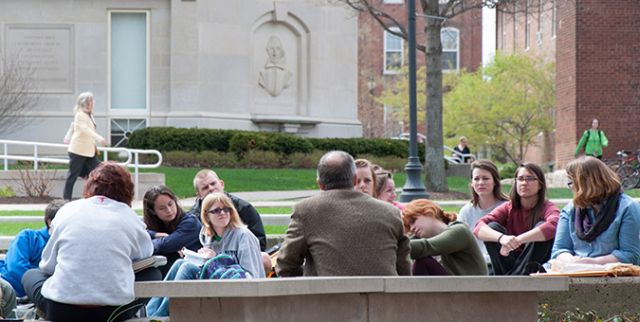
Philosophy Faculty Publications
Document Type
Article
Publication Date
Fall 2005
Publication Source
American Philosophical Association's Newsletter on Feminism and Philosophy
Abstract
Cory, my daughter, accuses me of having no thoughts of my own. I was talking with Jeremy [“Cory, what do you call him? partner? significant other? boyfriend?” “Mom, I just call him Jeremy.” Alright, then.]. Jeremy asked why I was an almost pacifist. Without even breathing, I launched into Addams’s arguments for pacifism, fully attributed to her, of course. That’s when Cory accused me of having no thoughts of my own. So, if I have no thoughts of my own, inhabiting Addams’s thoughts is not a bad substitute.
Remembering how Addams viewed much of her work as interpreting American institutions to immigrants, and interpreting the immigrant poor to middle-class Americans, I thought about a former colleague who often came to me for interpretive advice. She had been born and educated outside the United States and found Midwestern youth culture particularly baffling. One day she exploded, “Those students who slouch in the back of the classroom, baseball caps pulled over their eyes, they are so disrespectful! Are they insulting me because I am a woman of color?” How to answer this? All of the following statements are true: yes, they are insulting you in the sense that they are defying you to interest them in philosophy. But, don’t take it personally. And, yes, the fact that you are a woman of color no doubt enters into it. But then, White male colleagues report finding similar back rows in their classrooms. My advice was to rearrange the chairs into circles, squares, nested rectangles, or any configuration that eliminates back rows.
Feminists in the university need to do interpretive work and need to have interpretive work done on their behalf. Newer faculty need to have the institution interpreted to them; the university needs to have newer feminists interpreted to it.
Before launching into some observations and perplexities about interpretation, first a word about vocabulary. I started drafting this paper using the terms, “younger faculty” and “older faculty.” Then I remembered. The first woman the University of Dayton Philosophy Department hired came straight out of graduate school. She was forty-five. I started my tenure-track job at age forty-two and received tenure just shy of fifty. We were already old when we were young. Scratch an older woman faculty member, and you get a story. So, instead of “younger” and “older,” I’ll use the slightly unwieldy terms, “newer colleagues” and “more established colleagues.” In an attempt to preserve confidentiality, I’ve silently elided colleagues from my department, other departments on campus, and other universities.
Inclusive pages
3-6
Document Version
Published Version
Copyright
Copyright © 2005, Marilyn Fischer
Publisher
American Philosophical Association
Volume
5
Issue
1
eCommons Citation
Fischer, Marilyn, "Feminism and the Art of Interpretation: Or, Reading the First Wave to Think about the Second and Third Waves" (2005). Philosophy Faculty Publications. 131.
https://ecommons.udayton.edu/phl_fac_pub/131



Comments
This document is provided for download in compliance with the publisher's policy on self-archiving. Permission documentation is on file.